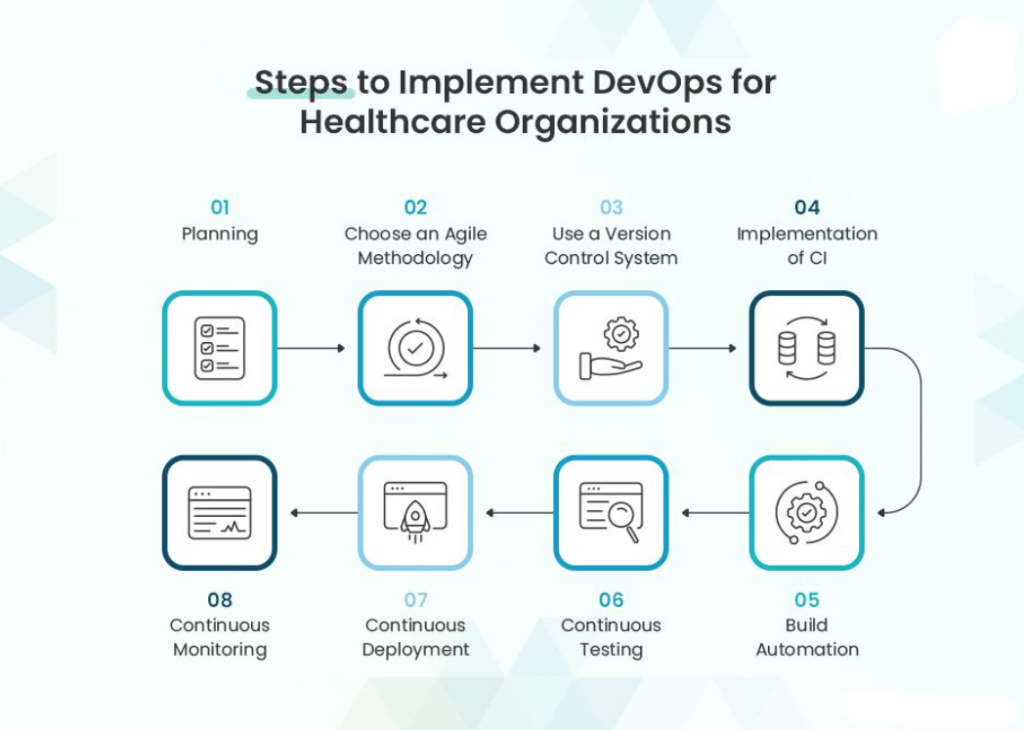Upgrade & Secure Your Future with DevOps, SRE, DevSecOps, MLOps!
We spend hours on Instagram and YouTube and waste money on coffee and fast food, but won’t spend 30 minutes a day learning skills to boost our careers.
Master in DevOps, SRE, DevSecOps & MLOps!
Learn from Guru Rajesh Kumar and double your salary in just one year.

In healthcare, DevOps integrates software development and IT operations to enhance patient care and operational efficiency. By automating processes through continuous integration and delivery, healthcare organizations can swiftly implement digital solutions like telehealth platforms and patient portals, leading to improved patient engagement and satisfaction. DevOps also ensures compliance with stringent healthcare regulations by embedding security measures throughout the development lifecycle, safeguarding sensitive patient data. Additionally, it fosters collaboration among cross-functional teams, streamlining workflows and reducing errors, which is crucial in delivering timely and effective healthcare services.
Understanding DevOps in Healthcare
DevOps, a blend of “Development” and “Operations,” is a methodology that emphasizes collaboration, communication, and integration between software developers and IT operations. In the context of healthcare, DevOps aims to streamline the software delivery process, ensuring that applications are developed, tested, and deployed rapidly and reliably. This approach is particularly crucial in healthcare, where timely access to accurate information can significantly impact patient outcomes.
Benefits of Implementing DevOps in Healthcare
- Enhanced Collaboration and Communication: DevOps fosters a culture of collaboration between development, operations, and healthcare professionals. This synergy ensures that software solutions are aligned with clinical needs, leading to more effective and user-centric applications.
- Accelerated Delivery of Services: By automating processes and implementing continuous integration/continuous deployment (CI/CD) pipelines, healthcare organizations can reduce the time required to develop and deploy applications. This agility allows for quicker responses to regulatory changes and evolving patient needs.
- Improved Quality and Reliability: Automated testing and monitoring ensure that applications are thoroughly vetted before deployment, reducing the likelihood of errors and enhancing system reliability.
- Scalability and Flexibility: DevOps practices enable healthcare systems to scale efficiently, accommodating increasing patient data and user demands without compromising performance.
- Enhanced Security and Compliance: Integrating security measures throughout the development process (DevSecOps) ensures that applications comply with healthcare regulations such as HIPAA, safeguarding patient data.
Key Use Cases of DevOps in Healthcare
- Electronic Health Records (EHR) Management: Maintaining and updating EHR systems is a complex task. DevOps streamlines the development and deployment of EHR software, ensuring that patient records are up-to-date and secure. Frequent updates can address regulatory changes and improve usability. Healthcare – Mindbowser
- Telemedicine and Remote Monitoring: With the rise of telehealth, continuous updates to telemedicine platforms are essential. DevOps enables rapid feature development and bug fixes, ensuring a seamless and secure experience for patients and healthcare providers. Healthcare – Mindbowser
- Medical Device Integration: Hospitals rely on various medical devices; integrating them into the healthcare network can be complex. DevOps practices can help automate software testing and deployment for these devices, ensuring they work seamlessly and adhere to safety standards. Healthcare – Mindbowser
- Healthcare Mobile Applications: Mobile apps for appointment scheduling, medication reminders, and health tracking require frequent updates. DevOps facilitates the quick rollout of new features and security enhancements, improving patient engagement. Healthcare – Mindbowser
- Clinical Decision Support Systems (CDSS): CDSS provide healthcare professionals with real-time patient information and treatment recommendations. DevOps supports rapid updates and improved algorithms, enhancing patient care and safety. Healthcare – Mindbowser

Steps to Implement DevOps in Healthcare
- Continuous Planning: Begin by evaluating operational and development activities, aligning them with DevOps principles. Assess technical resources, security policies, and budget allocations. Engage stakeholders to define clear objectives and expectations.
- Version Control Implementation: Utilize version control systems to manage code repositories, allowing developers to track changes and collaborate effectively. Tools like Git facilitate streamlined development processes.
- Continuous Integration (CI): Regularly merge code changes into a central repository, followed by automated builds and testing. CI tools ensure efficient code management and early detection of issues.
- Automated Testing: Implement automated testing frameworks to validate code changes continuously. This approach ensures that new features do not introduce regressions and that the application remains robust.
- Continuous Deployment (CD): Automate the release process to deploy applications into production seamlessly. CD ensures that software updates are delivered to users promptly, enhancing the ability to respond to user feedback and changing requirements.
- Monitoring and Feedback: Establish comprehensive monitoring to track application performance and user interactions. Collect feedback to inform future development cycles, ensuring that the application evolves to meet user needs.
Challenges and Considerations
While DevOps offers numerous benefits, healthcare organizations must navigate challenges such as:
- Regulatory Compliance: Ensuring that all processes and applications comply with healthcare regulations requires meticulous attention and continuous monitoring.
- Cultural Shift: Transitioning to a DevOps culture necessitates changes in organizational mindset, encouraging collaboration and breaking down traditional silos.
- Security Concerns: Integrating security throughout the development process is crucial to protect sensitive patient data and maintain trust.

 Starting: 1st of Every Month
Starting: 1st of Every Month  +91 8409492687 |
+91 8409492687 |  Contact@DevOpsSchool.com
Contact@DevOpsSchool.com